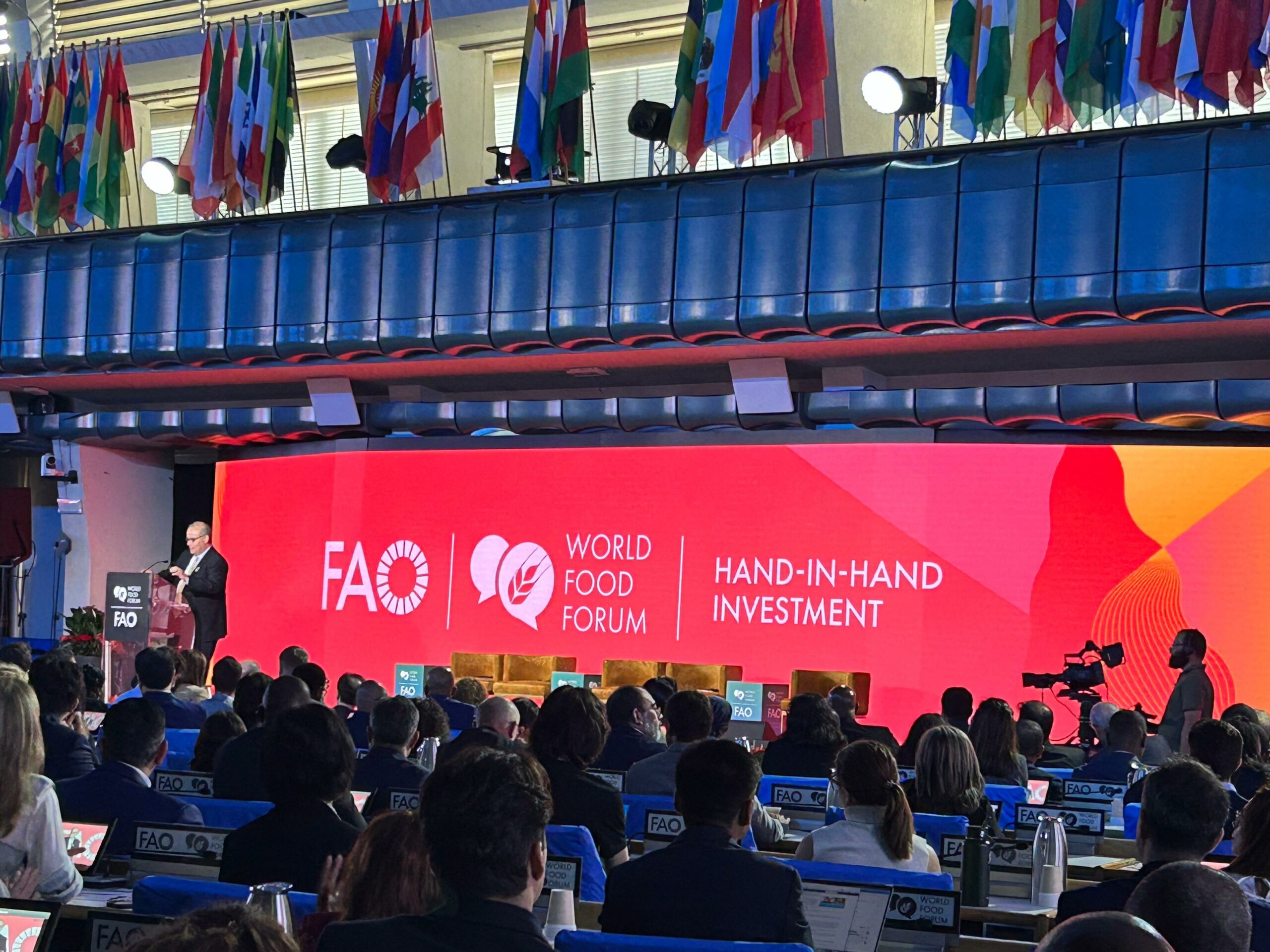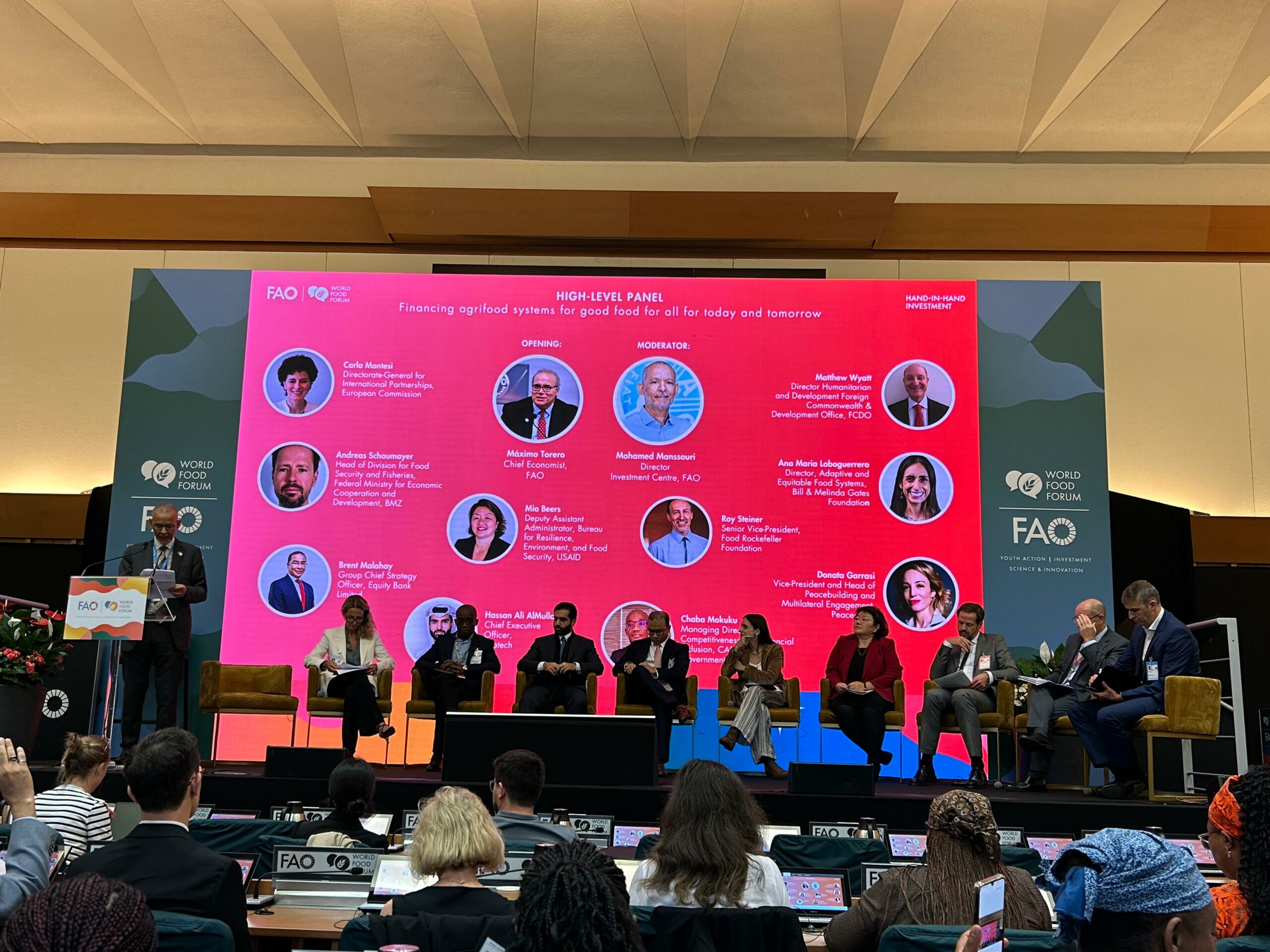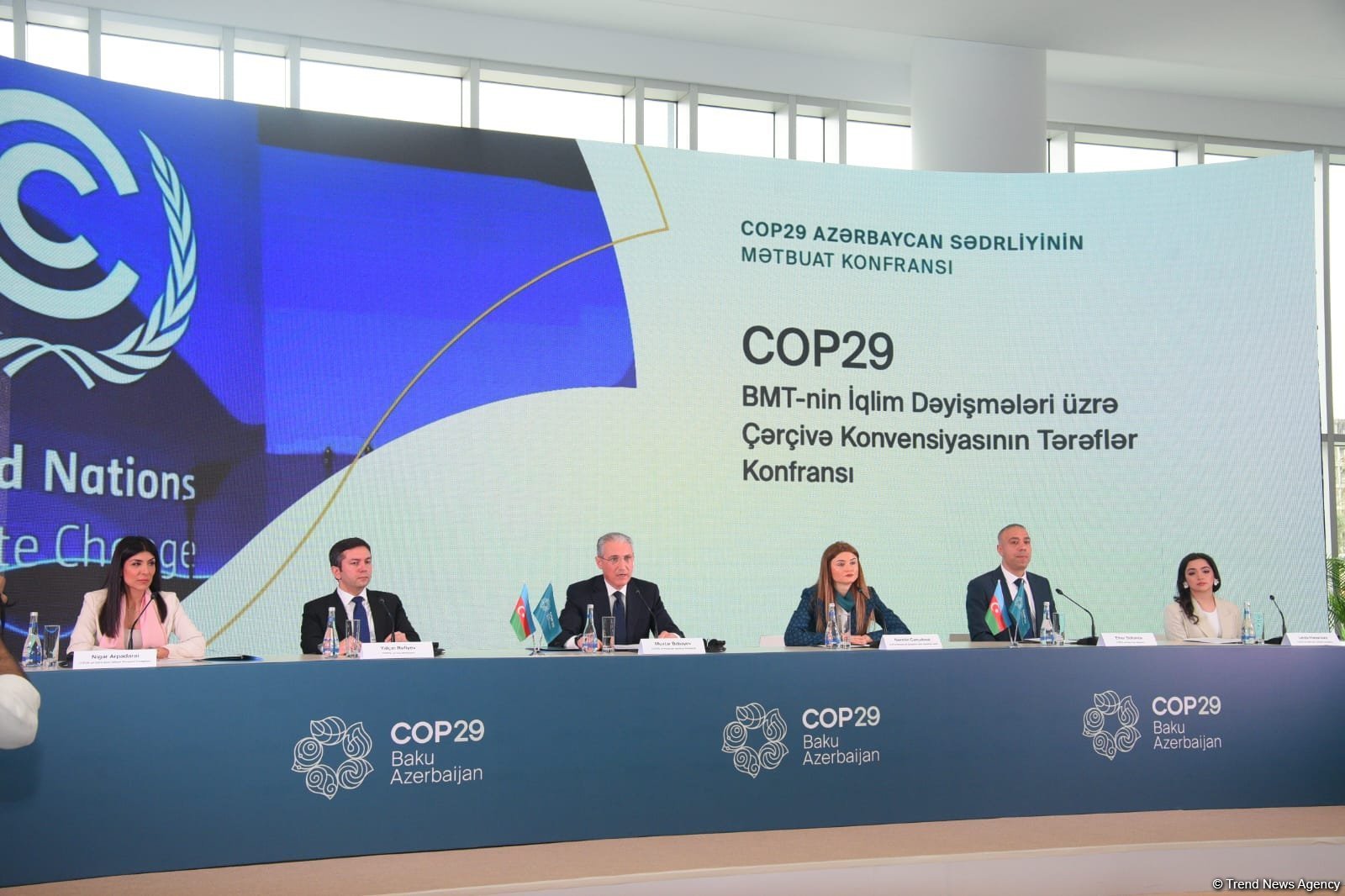Highlights: World Food Forum 2024
| The fourth edition of the World Food Forum (WFF), FAO’s flagship event since 2021, opened on Monday, October 14th, with a ceremony at the Food and Agriculture Organization (FAO) headquarters in Rome. Running from October 14 to 18, the event brought together global experts, young changemakers, and investors to discuss pressing issues around food security. This year’s forum focused on the theme “Good Food for All, for Today and Tomorrow,” with a strong emphasis on youth-driven initiatives, innovation, and investment strategies. Key sessions included the Global Youth Action Forum, the Science and Innovation Forum, and the Hand-in-Hand Investment Forum, providing a platform for knowledge exchange and collaboration between governments, the private sector, and development organizations. The event aimed to mobilize action toward achieving the FAO’s Strategic Framework 2022-31 and advancing the 2030 Agenda for Sustainable Development. |
This year’s World Food Forum (WFF) centered on the theme “Good Food for All, for Today and Tomorrow,” bringing together the “Four Betters” – better production; better nutrition; a better environment; and a better life, as expressed by FAO Director-General QU Dongyu. These principles serve as the foundation for the FAO’s work on key Sustainable Development Goals (SDGs)—SDG 1 (No Poverty), SDG 2 (Zero Hunger), and SDG 10 (Reduced Inequalities)—while also advancing the broader 2030 Agenda for Sustainable Development.
Voices from small-sized, low-income Global South countries highlighted at the World Food Forum opening ceremony on October 14th
During the opening ceremony, Director-General QU Dongyu reaffirmed the forum’s focus on youth, science, innovation, and targeted investments, which he identified as “key elements for transformational change.” Under his leadership, the WFF has evolved into a youth-led global platform since its establishment in 2021. By actively engaging young leaders, the forum advocates that it has broadened the conversation beyond traditional government leadership, creating a space for discussions and shared initiatives rather than strict agenda implementation.
Following FAO’s DG’s intervention, WTO Director-General Ngozi Okonjo-Iweala emphasized the need for agricultural trade reform to build resilient agrifood systems, particularly in Africa and South Asia.
Several representatives from small-sized, low-income countries in the Global South, including those from Africa, Latin America, and the Caribbean, expressed their thought. King Mswati III of Eswatini and King Letsie III of Lesotho, representing African nations, called for transformative action to address hunger and malnutrition, stressing the importance of sustainability and international cooperation.
Leaders from countries such as the Dominican Republic, Liberia, and Peru—nations characterized by low to middle-income economies in the Global South—reiterated the need for sustainable agricultural practices and climate-resilient solutions. President Luis Rodolfo Abinader Corona of the Dominican Republic, President Nyuma Boakai of Liberia, and President Dina Ercilia Boluarte Zegarra of Peru all underscored the importance of supporting smallholder farmers and local food production, particularly in vulnerable communities.
The voices of Prime Minister Mia Amor Mottley (Barbados), President Miguel Díaz-Canel (Cuba), Prime MinisterTshering Tobgay (Bhutan), and President Santiago Peña Palacios (Paraguay) further highlighted the need for innovative solutions, equitable access to food, and the empowerment of vulnerable populations to combat hunger and inequality. The Cuban president called for a collective international effort to ensure food security, underscoring Latin America’s potential to lead in this endeavor, advocating for new international investments in his country.
Three fora in one: Global Youth Action Forum, Science and Innovation Forum, Hand-in-Hand Investment Forum
WFF Global Youth Action Forum
This forum places youth at the center of discussions, allowing young leaders to contribute ideas and advocate for solutions through workshops, panels, and collaborative sessions. This forum has gained momentum under the current Director-General’s leadership, emphasizing youth engagement. However, it remains largely symbolic in nature, focusing on dialogue and raising awareness.
FAO Science and Innovation Forum
This forum brought together scientists, researchers, and experts to explore the role of research and innovation in addressing challenges within agrifood systems. The discussions emphasized cutting-edge technologies and knowledge sharing, particularly around climate adaptation, food security, and sustainability. Its value lies in highlighting scientific advancements and encouraging partnerships.
FAO Hand-in-Hand Investment Forum
As an initiative of the FAO Investment Center, directed by Mohamed Manssouri, the forum focuses on fostering investment strategies and financial collaborations in the agrifood sector. The FAO Hand-in-Hand Initiative and its annual Hand-in-Hand Investment Forum target Small Island Developing States (SIDS), Least Developed Countries (LDCs), and Landlocked Developing Countries (LLDCs), which together represent approximately 90 FAO members.
The forum serves as a platform for dialogue between governments, investors, and development organizations, aiming to mobilize resources for initiatives that enhance food security. During the forum, 29 countries participating in the FAO Hand-in-Hand Initiative—including Eswatini, Zambia, Lesotho, Tanzania, Uganda, Gabon, Cameroon, Rwanda, Sudan, Bhutan, Pakistan, and the Philippines—presented their investment opportunities and intervention proposals. These presentations were evaluated by representatives from Multilateral Development Banks, the national and global agrifood private sector, and International Financial Institutions. The forum emphasized the involvement of the private sector, both nationally and internationally, to drive investments in agrifood systems.
A high-level panel Financing agrifood systems for ‘Good food for all, for today and tomorrow‘ on October 16th brought together public and private sector actors—including representatives from the European Commission, the Bill and Melinda Gates Foundation, and Equity Bank Limited—to discuss scaling up agrifood projects and financing mechanisms, with a particular focus on managing financial and climate risks, especially in Africa.
Throughout the Hand-in-Hand Investment Forum, innovative tools from the Hand-in-Hand Initiative, such as the Geospatial Platform and advanced socio-economic methodologies, were showcased, aiming to better identify bottlenecks and unlock agricultural potential through a territorial approach. Additionally, a digital platform allowed investors to book one-on-one meetings with country representatives, fostering direct and immediate connections.
Overall, the Hand-in-Hand Initiative seeks to build momentum around actionable steps that governments, businesses, and the international community can take to accelerate the FAO’s Strategic Framework 2022-31and advance the 2030 Agenda. By bridging the gap between the investment needs of countries in deprived rural areas and the private sector’s interest in opportunities with diversified returns, the initiative aims to scale up production, trade, and value chains in vulnerable regions.
Family farming, Indigenous practices, and water scarcity, featured throughout the World Food Forum
In addition to these pillars, WFF 2024 featured the Mid-term Forum of the UN Decade of Family Farming, integrated into youth-led, technical, and policy discussions. It celebrated family farming as a core aspect of agrifood systems.
The issue of water scarcity in agriculture was also addressed through a Rome Water Dialogue session, while Indigenous practices were highlighted during the week-long Global Hub on Indigenous Peoples’ Food Systems.
All these activities coincided with World Food Day on October 16, under the theme “Right to Foods for a Better Life and a Better Future,” emphasizing the need for universal access to diverse, nutritious, affordable, and safe food.
| The initiative, which came into being under the leadership of Director General Qu Dongyu and supported by the organisation’s Chief Economist Maximo Torero, has grown in stature since its inception in 2021.
Despite the reservations of several Member States, which are attached to the formal framework of the traditional Committee on Food Security supported by the FAO, WFP and IFAD, which is being held the following week in Rome for its 52nd edition, the Forum has succeeded in mobilising the private sector on a large scale, attracted by the opportunity to engage in an open conversation with numerous public and private players. While many agriculture ministers from countries looking for investment made the trip, generally speaking the political level of the event remained fairly low. With only the FAO taking the lead, the agenda was rather vague, beyond the mobilisation of players. This is not without advantage for certain players in the sector. |
If you would like to discuss the political situation further and understand what impact it will have on the business climate and macroeconomic framework, as well as on regional and international policy, please do not hesitate to contact us.
We help our clients navigate political and financial dynamics from local to global.
Insights: High-Level Panel: Financing agrifood systems for ‘Good food for all, for today and tomorrow’ (Rome, 16 October 2024)
| As part of the Hand-in-Hand Investment Forum organized during the World Food Forum at the FAO in Rome (14-18 October 2024), this panel focused on key strategies to accelerate investment in agrifood systems, with a particular emphasis on achieving SDG 2: Zero Hunger. Moderated by Mohamed Manssouri (FAO Investment Center Director) and Máximo Torero (FAO Chief Economist), the panel brought together representatives from governments, financial institutions, foundations, and NGOs to address the pressing issues of food security, climate change, and investment challenges. |
- Urgency and political momentum: Torero highlighted the critical need to transform agrifood systems, with 2.8 billion people lacking access to healthy diets. He stressed the importance of aligning various global initiatives, including the G20 Global Alliance Against Hunger and Poverty, to avoid overlap and ensure action. He underscored the need for knowledge, financing, and action to support investment in agrifood systems, emphasizing the central role of resilience in facing conflict and climate change.
- Public and private investment: Andreas Schaumayer (Intpa) outlined the EU’s approach to reorienting international cooperation towards sustainable agrifood systems, emphasizing the need for both public and private investment. He highlighted the EU’s Global Gateway initiative, which mobilises €300 billion, focusing on derisking investment and scaling up sustainable development efforts, particularly in agriculture. The need for a more adapted regulatory environment on policies on taxation, trade, and SPS measures, crafted to country-specific realities was stressed.
- Climate finance and gender equity: Matthew Wyatt (FCDO) emphasized the importance of climate finance, noting that Africa receives only 3% of total climate finance. He outlined three core solutions: 1) Boosting climate finance for women and small-scale farmers, 2) Scaling systematic investments into small agribusinesses facing a $100 billion financing gap, and 3) Improving coordination among international actors. The UK government’s involvement with the Climate Gender Equity Fund and its partnerships with IFAD and the African Union were also highlighted.
- Investment in small farms and infrastructures and market integration: Multiple panelists, including Ana Maria Loboguerrero (Bill & Melinda Gates Foundation) and Brent Malahay (Equity Bank), stressed the need to focus on small farmers and small-scale producers. Loboguerrero called for more cohesive investments across gender, climate, and nutrition, emphasizing the COP28 Declaration on sustainable agriculture. Malahay advocated for integrating local value chains with regional and global markets, leveraging technology to support smallholder farmers and build resilience.
- Technology and innovation: The role of technology in accelerating scale and improving productivity in agrifood systems was a recurring theme. Brent Malahay highlighted the need for a transformed Africa, leveraging NGO funding and productivity gains through technology.
- Challenges and opportunities: Panelists, including Hassan Ali AlMulla (Silatech) and Chaba Mokuku (Lesotho Government), discussed the challenges of food insecurity caused by conflict and cultural factors, while highlighting opportunities for investment through partnerships with institutions like the World Bank and the IBSA Fund.
In conclusion, the forum underscored the need for a blended approach to public-private investment, de-risking mechanisms, and coordinated global efforts to address food security challenges and achieve sustainable agrifood systems. The discussions emphasized the importance of targeting small-scale producers, integrating climate action, and fostering innovation to ensure long-term food security and resilience.
The High-Level Panel can be reviewed online following this link: https://webtv.un.org/en/asset/k1j/k1juo5tpit
Annex: List of speakers present at the High-Level Panel Financing agrifood systems for ‘Good food for all, for today and tomorrow’
- Mohamed Manssouri – Director of FAO Investment Center (Moderator)
- Máximo Torero – Chief Economist, FAO
- Andreas Schaumayer – Head of Division for Food Security and Fisheries, Federal Ministry for Economic Cooperation and Development (BMZ)
- Matthew Wyatt – Director, Humanitarian and Development, Foreign, Commonwealth and Development Office (FCDO)
- Mia Beers – USAID
- Roy Steiner – Senior Vice President, Food, Rockefeller Foundation
- Ana Maria Loboguerrero – Director, Adaptive and Equitable Food Systems, Bill & Melinda Gates Foundation
- Brent Malahay – Group Chief Strategy Officer, Equity Bank Limited
- Hassan Ali AlMulla – CEO, Silatech
- Chaba Mokuku – Government of Lesotho
- Donata Garrassi – Vice-President and Head of Peacebuilding and Multilateral Engagement, Peaceinvest
If you would like to discuss the political situation further and understand what impact it will have on the business climate and macroeconomic framework, as well as on regional and international policy, please do not hesitate to contact us.
We help our clients navigate political and financial dynamics from local to global.





